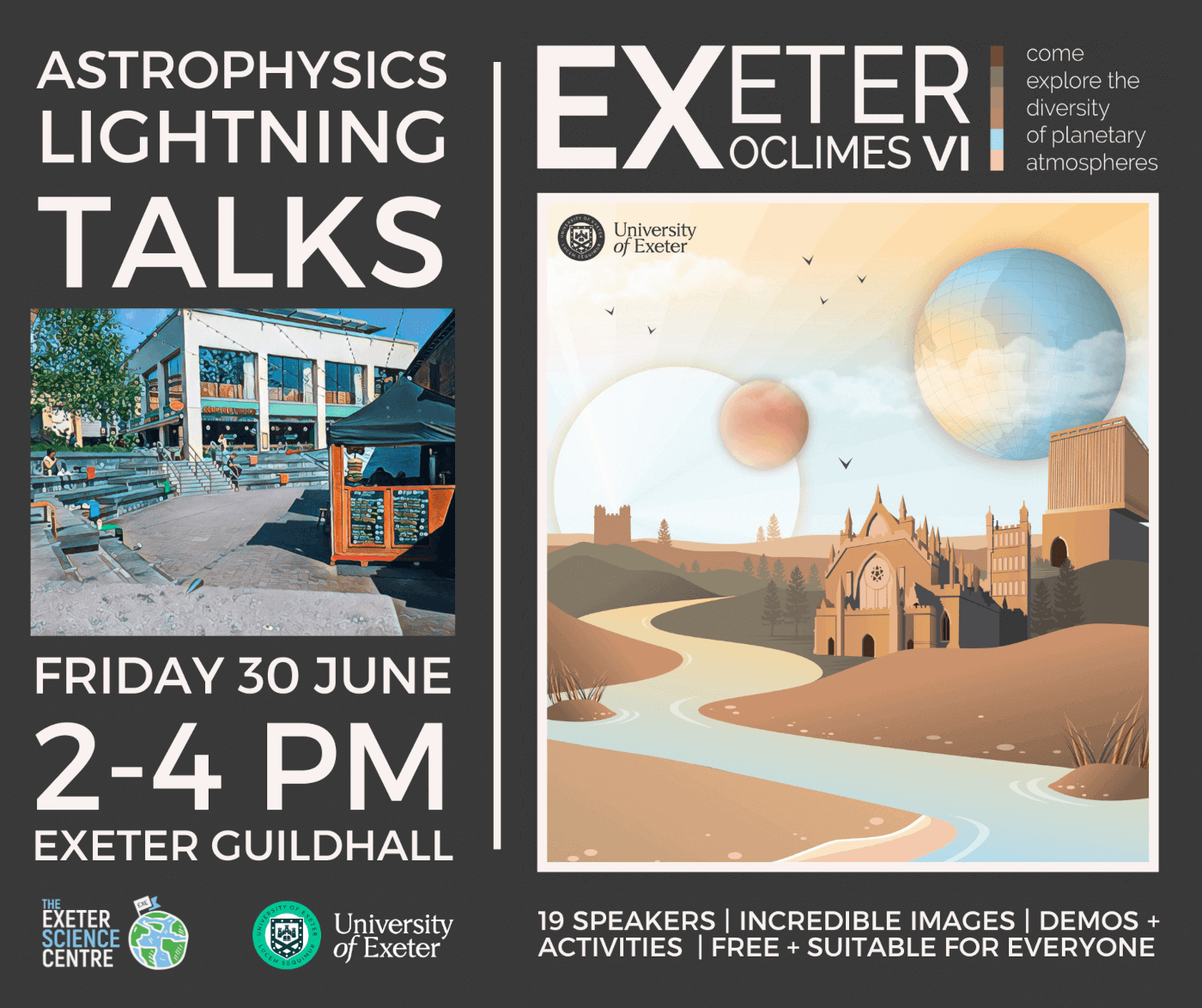Exoclimes Lightning Talks

The University of Exeter hosted an international conference ‘Exoclimes’ from 26th-30th June, focused on research into the climates of planets outside of our solar system. And we wanted to share this awesome research with the public!
On the afternoon of Friday 30th June 2023, the astrophysicists descended on Exeter Guildhall Shopping Centre to give short ‘lightning talks’ about their research.
Check out the talks below, and you can view the full schedule and speaker details, plus extra resources to learn more about astrophysics and exoplanets.
If you enjoyed this, please let us know on our short survey below, and check out the resources from our recent Climate Exhibition, all about planetary climates!
Enjoyed the talks? Fill in the survey – it’s a very short one:
Watch the Talks
Schedule & Speaker Profiles
Round 1: 14:00 – 14:15
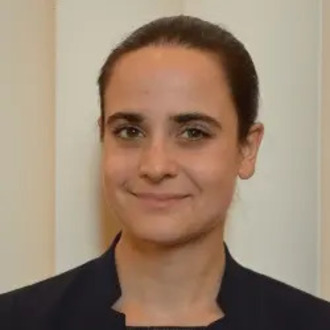
Dr Raphaëlle Haywood – University of Exeter
Senior Lecturer: exoplanet hunting and planetary habitability
There is no planet B

Collin Cherubim – Harvard University
PhD candidate: exoplanet atmospheres and astrobiology
Helium atmospheres on distant planets

Dr Lorenzo Pino – Arcetri Astrophysical Observatory, Italy
Staff member, researching hot gas giant exoplanets
A portrait of the hottest exoplanet

Ruizhi Zhan – Peking University
PhD candidate: Habitable zone around white dwarfs
Living around white dwarfs?

Shrishmoy Ray – University of Exeter
PhD candidate: exoplanet imaging
Using the James Webb Space Telescope to find life signatures in distant worlds
Round 2: 14:30 – 14:45

Dr Sebastiaan Krijt – University of Exeter
Lecturer: planet formation
On the formation of Earth-like planets

Dr. Sarah E. Moran – University of Arizona
Postdoctoral research fellow: planetary hazes
Smoggy Sunsets in Distant Skies

Robin LV – Peking University
PhD candidate: exoplanet surface conditions
Color and reflectance
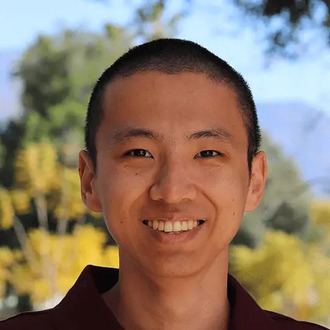
Dr Michael Zhang – University of Chicago
Postdoctoral research fellow: exoplanet atmospheres – observations + modelling
A map of a tiny, partially molten world
Round 3: 15:00 – 15:15
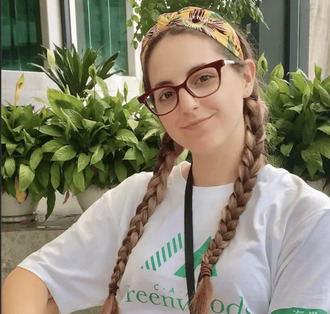
Federica Rescigno – University of Exeter
PhD candidate: exoplanet hunting, solar radial velocity data
Hunting for new worlds: a How To guide

Giannina Guzman Caloca – University of Maryland
PhD candidate: exoplanet atmospheres and astrobiology
So, how do we observe the atmospheres of faraway planets?
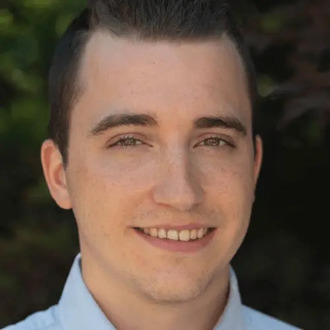
Dr Tobias Meier – University of Oxford
Postdoctoral Research Fellow: interior and atmosphere of rocky exoplanets
Diving into magma oceans and exoplanet interiors
Round 4: 15:30 – 15:45

Dr Shweta Dalal – University of Exeter
Postdoctoral Research Fellow: exoplanet hunting
HD3167: Exploring the Mysteries of a Unique Planetary System

Matt Lodge – University of Bristol
PhD candidate: aerosols in exoplanet atmospheres
Aerosols in exoplanet atmospheres

Dr Michael Zhang – University of Chicago
Postdoctoral research fellow: exoplanet atmospheres – observations + modelling
MANTIS: A tiny space telescope to explore exoplanet host stars
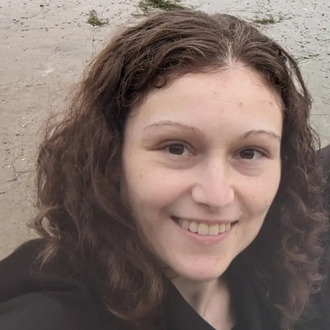
Evelyn Macdonald – University of Toronto
PhD candidate: Climates of tidally locked, habitable zone planets
Climates of tidally locked planets with dayside land
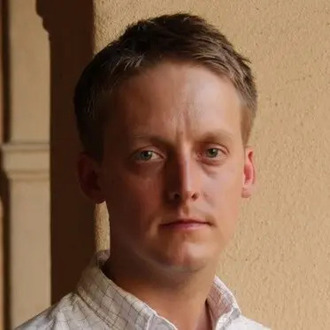
Prof Sasha Hinkley – University of Exeter
Associate Professor of Astrophysics: Ground and Space-based observations of exoplanets
Directly Imaging Extrasolar Planets with the James Webb Space Telescope
Resources
For more information about the topics covered in these talks, have a look at the following resources:
Exoclimes conference page: find out more about the conference!
Exoclimatology webpage: find out more about the University of Exeter’s research group in planetary climates.
James Webb Space Telescope: the most advanced space telescope ever created by humans (so far!) – check out the incredible images, some of which will be shown in the talks.
Imaging in infrared: find out more about how and why the JWST (and other telescopes) use infrared to see distant objects in space.
Exoplanet tour – 360 video: This video is based on the University of Exeter’s exoplanet research. You can find more information and the download links on the exoclimatology website.
No Planet B: Raphaëlle and her colleague wrote an excellent article explaining why there’s No Planet B – read the article here, and she gave a 1 hour seminar talk to the University of Exeter’s Global Systems Institute on the subject which you can watch here.
Advanced resources:
Lecture Notes for courses on planetary climates, by the late Professor Adam Showman:
– Lecture notes based on the textbook of Holton
– General Planetary Climate Course
– Lectures based on the textbook of Vallis
